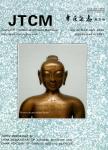Effects of aqueous extract from red Liriope platyphylla on phthalic-anhydride-induced atopic dermatitis in Interleukin-4/Luciferase/Consensus non-coding sequence-1 transgenic mice evaluated in terms of luciferase signal and general phenotype biomarkers
Effects of aqueous extract from red Liriope platyphylla on phthalic-anhydride-induced atopic dermatitis in Interleukin-4/Luciferase/Consensus non-coding sequence-1 transgenic mice evaluated in terms of luciferase signal and general phenotype biomarkers作者机构:College of Natural Resources and Life Science/Life and Industry Convergence Research InstitutePusan National UniversityMiryang 627-706South of Korea College of Human EcologyPusan National UniversityBusan 609-735south of Korea College of Pharmacy and Medical Research CenterChungbuk National UniversityChungju 361-763south of Korea College of PharmacologyChungbuk National UniversityChungju 361-763south of Korea
出 版 物:《Journal of Traditional Chinese Medicine》 (中医杂志(英文版))
年 卷 期:2017年第37卷第4期
页 面:475-485页
核心收录:
学科分类:1008[医学-中药学(可授医学、理学学位)] 1007[医学-药学(可授医学、理学学位)] 1006[医学-中西医结合] 1005[医学-中医学] 1002[医学-临床医学] 100602[医学-中西医结合临床] 10[医学]
基 金:supported by grants to Dr. Dae Youn Hwang from the Korea Institute of Planning Evaluation for Technology of Food Agriculture Forestry and Fisheries (116027-032-HD030)
主 题:Dermatitis, Atopic Liriope plant Interleukin-4 Luciferases Mice, transgenic Phthalic anhydrides Immunoglobulin E
摘 要:OBJECTIVE: To quantitatively evaluate the therapeutic effects of Red Liriope platyphylla(RLP) on atopic dermatitis(AD), alterations in the luciferase(Luc) signal and general phenotype biomarkers were compared in phthalic anhydride(PA) treated Interleukin-4(IL-4)/Luc/Consensus non-coding sequence-1(CNS-1) transgenic(Tg) mice following treatment with aqueous extract of RLP(AEt RLP) for4 ***: Alterations in AD phenotypes were measured in IL-4/Luc/CNS-1 Tg mice following treatment with AEt RLP using inflammation parameter analysis, bioluminescence imaging analysis, histological analysis, reverse transcription-polymerase chain reaction, enzyme linked immunosorbent assay and Western blot ***: RLP contained high concentrations of total phenolic compounds, total flavonoid compounds and 5-HNE related to AD therapy. The Luc signal was only detected in the abdominal region and the submandibular lymph node(SL), mesenteric lymph node(ML), thymus and pancreas of the PA treated group. This signal was significantly decreased by 28%-73% throughout the body and in the four organs in PA + AEt RLP treated group. Furthermore, the lymph node weight, immunoglobulin E concentration and dermal thickness were decreased by 37%-67% in the PA + AEt RLP treated ***: Our findings suggest that the therapeutic effect of AEt RLP on PA induced AD could be successfully quantified by comparison of Luc signals and AD phenotype markers in IL-4/Luc/CNS-1Tg mice, and that the Luc signal was as sensitive as the general AD phenotypes, enabling detection of effects without euthanasia.



